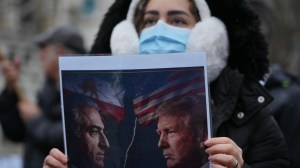An expert explains: What will it take to resume India-Pakistan trade?
Why has Pakistan’s new Foreign Minister spoken of the possibility of resuming trade with India? What is the history of trade between the two countries, and what will it take to resume the commerce?
 Pakistani truck at Trade Facilitation centre at Salamabad, Uri. (Express Photo By Shuaib Masoodi)
Pakistani truck at Trade Facilitation centre at Salamabad, Uri. (Express Photo By Shuaib Masoodi)On March 23, Pakistan’s Foreign Minister Muhammad Ishaq Dar said his country may “seriously examine” the question of resuming trade with India.
Pakistan stopped trade after the constitutional changes in Jammu and Kashmir in 2019. Like other aspects of the India-Pak relationship, trade too has been impacted by Islamabad’s hard line on Kashmir and its support for terrorism. The dire state of the Pakistani economy, however, has raised hopes for a change in Pakistan’s approach. But New Delhi will keep its fingers crossed.
What explains the timing of Pakistani minister Dar’s comments?
Over the years, Dar has headed several economic ministries, and he served as finance minister in the previous Shehbaz Sharif government (2022-23). He has closely watched the deepening of Pakistan’s economic crisis, and he was involved in the country’s negotiations for financial assistance from the International Monetary Fund (IMF).
A second factor is pressure from the business community. One of the conditions imposed by the IMF was the raising of energy prices, but this hurt production within Pakistan. Imports have come down because of the low price of the Pakistani rupee.
Dar mentioned that trade between India and Pakistan is already taking place through Dubai or other countries. This raises costs, and the logic of efficiency and geography demand a resumption of direct trade.
Meanwhile, Pakistan’s relative power position vis-à-vis India has declined. Its GDP is now 10 times smaller than India’s. This will continue to widen amid Pakistan’s low growth rates.
Pakistan’s relationships with Afghanistan and Iran have become tense. In fact, Pakistan’s ties with India are more stable than its western frontier with Afghanistan and Iran.
How seriously should Dar’s comments be taken?
The comments by the Pakistani minister show the growing imperative of improving economic ties with India. But there is no consensus in Pakistan on this issue.
In 2021, Pakistan allowed trade in sugar and cotton but reversed the decision in a day — an episode that spotlights the complexity of engaging with India in Pakistan. Back-channel negotiations between the Indian security establishment and the Pakistan Army at the time led to a renewal of the 2003 ceasefire along the Line of Control (LoC).
There was also a proposal to initiate confidence-building measures. The resumption of trade in sugar and cotton was considered sensible since Pakistan needed them and India was in a position to supply. Then Prime Minister Imran Khan, who was also Commerce Minister, supported the proposal — but flipped when it went before the Cabinet after he faced opposition from the hardliners. This happened even though then Pakistan Army Chief General Qamar Javed Bajwa seemed interested in relaxing the tensions.
What are the challenges to normalisation of India-Pakistan trade?
The leaders of the new coalition government, President Asif Ali Zardari of the Pakistan People’s Party (PPP) and Prime Minister Shehbaz Sharif of the Pakistan Muslim League-Nawaz (PML-N), have traditionally favoured trade with India. But given that PPP chairman Bilawal Bhutto Zardari, who was Foreign Minister in 2022-23, has taken a hard line against India in public statements over the last few years, it is not clear if his party will support trading with India.
Then there is the Pakistan Army. When Dar talked about consulting “stakeholders” on trade, he was referring to the military. Army Chief General Syed Asim Munir has not said very much about India so far — so it is not known where he stands.
Further, Pakistan has put preconditions on talks with India, demanding the reversal of the decision on Article 370 — which will not happen. The question is, how does Pakistan climb down from the high horse without losing face?
India too would not want to trade without major steps from Pakistan on curbing terrorism. External Affairs Minister S Jaishankar has frequently said trade and terrorism cannot go together.
In the 1990s, Pakistan was on the offensive in demanding Indian concessions on Kashmir. Things were out of control in Kashmir then, and India was under pressure to yield. Today, India’s position is stronger, and the current government is not going to make any concessions.
The ball then is in Pakistan’s court; and there is no domestic consensus on how to reset ties with India. This is the problem: trade with India makes economic sense for Pakistan. But the politics of doing the right thing are quite hard in Pakistan.
What is the broad history of India-Pakistan trade?
After the wars of 1965 and 1971, trade links were largely cut off. The borders were shut, and became heavily militarised, which is part of the reason trade volumes between the two countries never grew significantly. Much of the real trade took place via other countries.
 India’s bilateral trade with Pakistan over the years.
India’s bilateral trade with Pakistan over the years.
Agreements such as the SAARC Preferential Trade Agreement (1993) were signed, but Pakistan was not interested in trade with India. It demanded that India must resolve the Kashmir issue before the normalisation of economic ties.
In the 2010s, the Manmohan Singh-led government tried very hard to improve trade ties. The World Bank was helping negotiate a petroleum agreement that would allow Pakistan to buy fuel across the border from the Jalandhar refinery. There were also talks about trading in electricity. However, the Pakistan Army pulled the plug every time.
During the South Asian Association for Regional Cooperation (SAARC) Summit of 2014, member countries agreed to open borders to facilitate the movement of trucks and trains. But the Pakistan Army stepped in again to block the agreement.
Meanwhile, India’s position on Kashmir has strengthened. The abolition of Article 370 shocked Pakistan. Its efforts to get China to do something about it in the UN Security Council did not work. Pakistan’s best friends in the Gulf region, Saudi Arabia and the UAE, have not criticised India, and have maintained close ties with New Delhi.
Pakistan recognises that it has put itself in a tight corner. The logic of the economy demands that it changes its hard line. But domestic political inertia makes it difficult for Pakistan to do so.
How soon could India and Pakistan move towards better economic ties?
With Lok Sabha elections set to begin in less than a month, it is not likely anything major will happen immediately between New Delhi and Islamabad.
All successful India-Pakistan negotiations have taken place in private, and the next three months offer room for quiet diplomacy by the two sides. One immediate step could be for Pakistan to say it will send its High Commissioner back. The UAE, in particular, has been encouraging Pakistan to talk to India. Reports have suggested that the UAE played a major role in getting the two countries together in 2021.
Who benefits from a resumption of bilateral trade?
For Pakistan, it makes sense to reboot its economy in partnership with India.
Under the Manmohan Singh government, there was an attempt at serious negotiations to sort out trade-related issues. Members of the Federation of Indian Chambers of Commerce and Industry (FICCI) travelled to Pakistan in 2012 to negotiate mutually beneficial terms of trade.
The Zardari government had announced its intent to give India the Most Favoured Nation (MFN) status to India under World Trade Organisation (WTO) rules, meaning it would not discriminate against New Delhi as a trade partner. But the Pakistan Army applied the brakes.
In India, traders in Punjab have been reported as saying they want to trade with Pakistan. Lowering the tensions with Pakistan will surely be beneficial for India too. But Pakistan does not appear ready to break with its past policies. When it does, India should be ready to reciprocate.
Dr C Raja Mohan is Contributing Editor on international affairs for The Indian Express and visiting research professor at the Institute of South Asian Studies, National University of Singapore.
He spoke to Rishika Singh.
- 01
- 02
- 03
- 04
- 05






































